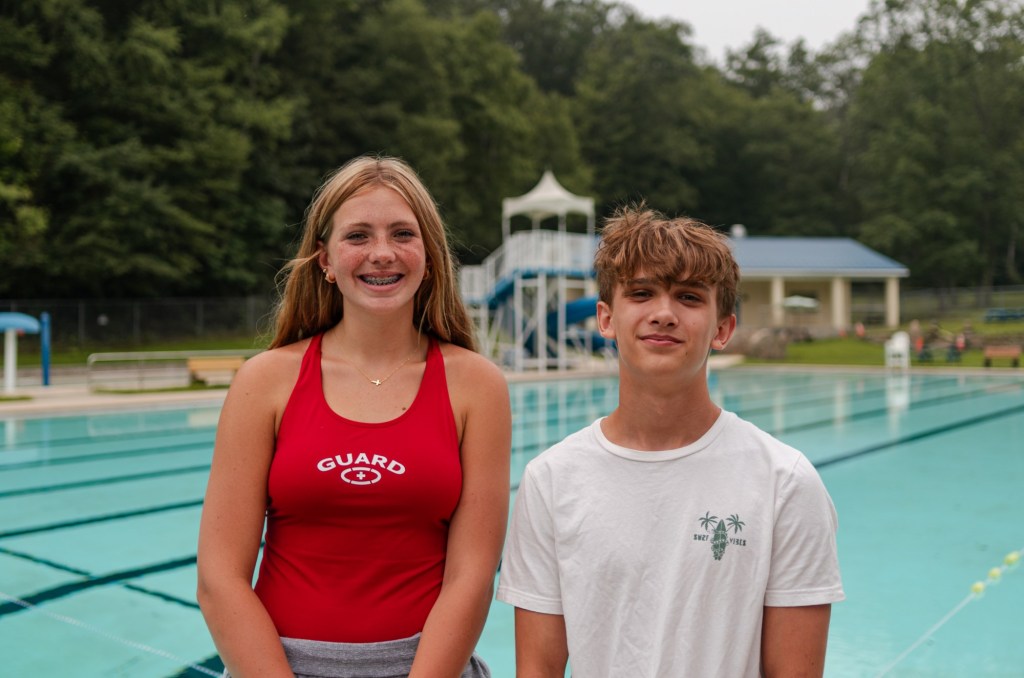Of the nearly 20 saves that lifeguards at the Tamaqua Community Pool have made this summer, their recent rescue of three struggling siblings from the water stands out as the most dramatic.
It occurred July 23, when an 11-year-old girl was trying to swim across the pool’s deepest section near its diving well while holding her brother and sister, aged 6 and 4.
They were all in distress, with the oldest girl barely able to hold her brother’s and sister’s heads above water.
In jumped two 15-year-old lifeguards, Brandon Temarantz, of Andreas, and Millie Black, of Lake Hauto. Both are in their first summer of lifeguarding at the facility known as The Bungalow, a public pool owned by the borough of Tamaqua.
Temarantz got to one of the younger children first and swam them to the wall. He also extended a rescue tube to the other two siblings but they dropped it, likely because they were too exhausted to hold on, said pool manager Beth Fritzinger-Jones.
Black reached the other two, put her arms around both of them and swam them to the wall. It was all made more difficult by the children’s frantic state, which is often the case with near-drowning victims.

The pool at that point is 11 feet deep and the three siblings were clearly not strong swimmers, Fritzinger-Jones said. They were in serious trouble and fortunate to receive the quick intervention of Temarantz, Black and several other lifeguards who pitched in, she said.
“I’m super proud of them,” Fritzinger-Jones said of her lifeguards.
After their fast removal from the water, the children did not appear to suffer any injuries, she said. The children went home with their parents, who were told to look for signs of “dry drowning,” or secondary drowning, conditions that can occur hours after inhaling water and which can cause serious health consequences.
The children’s family was not available for comment.
It was the 19th save of the summer at The Bungalow, all successful extrications of children at risk of drowning or injury, Fritzinger-Jones said. Most of those rescues occurred with younger children whose parents were not paying attention to them at the time, she said.

“Some people expect us to be their babysitting service,” Fritzinger-Jones said. “That’s not what we are. Everyone should put down their phones and be watching their own children.”
Some parents also do not realize that their children are not capable of swimming in water over their heads, she said.
“Just because they can doggy paddle in two feet of water doesn’t mean they should be trying to swim in the deep end,” she said.
Temarantz and Black said that they relied on the Red Cross training they’d received earlier this year while earning their lifeguard certifications. Both also are sophomores at Tamaqua High School and participate in athletics, with Temarantz playing soccer and swimming, and Black playing volleyball and basketball and running track and cross-country.
Later this month they’ll receive citations from Tamaqua Council for their heroic actions at the pool.
Most summers The Bungalow has required even more saves than it has this year, Fritzinger-Jones said, recalling years where there were two dozen just within the first few weeks after opening.
Other pools in the region also speak of how lifeguard interventions have helped save lives.
As a lifeguard for a decade, Lizzy McGran, executive director of the public pool in Conyngham, Luzerne County,. has made a handful of rescues.
“Every time is so quick, it’s a shock to the system,” she said.
She trains lifeguards to scan the pool to recognize and reach a drowning person within 30 seconds and recommends that parents do likewise whenever their children are near water.
“Always watch your kids,” she said. “It happens so quickly.”
Conyngham pool’s lifeguards made 10 rescues in June a few years ago. Since then, McGran has required children to pass a swimming test before they enter the deep end or the separate diving pool. Swimmers who pass the test get wristbands that they wear all summer
There have been no drownings in Schuylkill County so far this year, said Dr. David Moylan, coroner.
But drowning is the leading cause of death for children age 1 to 4 and the second leading cause of unintentional injury death for those age 5 to 14, according to the U.S. Centers for Disease Control and Prevention.
This summer, a 9-year-old girl died on July 24 in a wave pool at Hersheypark, and K-9 lifeguards have helped their human handlers rescue four people at Beltzville State Park in Carbon County. In July, actor Malcolm-Jamal Warner died at the age of 54 while swimming in Costa Rica and getting caught in a strong current.
Closer to home, three people have been brought to the emergency room at Lehigh Valley Hospital-Hazleton after being retrieved from private pools, according to officials.
“A lot of people think. ‘it can never happen to me.’ It can happen to anyone, anytime,” said Megan Welch, senior program director for Greater Wyoming Valley Area YMCA.
Welch started teaching her 14-month-old son about water safety before they visited his grandparents’ pool with these lessons: “You hold mommy’s hand when you go outside. Never go over to the side of the pool. Don’t throw things into the pool.”
At the YMCAs in Wilkes-Barre and Pittston, children start swimming lessons by practicing how to get back to the side of the pool and how to pull themselves out in case they do fall in.
Most drownings happen when children aren’t supposed to be near water, so the American Red Cross tells adults to never leave children unattended in the vicinity of a pool, pond, beach or bathtub.
When swimming, select locations that have lifeguards, but still have parents and other adults take shifts as designated watchers.
If someone needs help, children are taught the Red Cross mantra of “Reach, throw, don’t go.”
Rather than entering the water themselves, the children reach out to swimmers with objects like towels and pool noodles.
Welch has the younger children lie flat before extending their hand or a towel to a swimmer and demonstrates what happens when they don’t.
“If you’re standing, feel how easy it is to tug you into the water,” she tells her students.
Adults, even experienced swimmers, can suffer from fatigue, cramps or medical events while in the water, she said. Therefore the Red Cross also counsels adults against swimming alone.
Originally Published:
<






